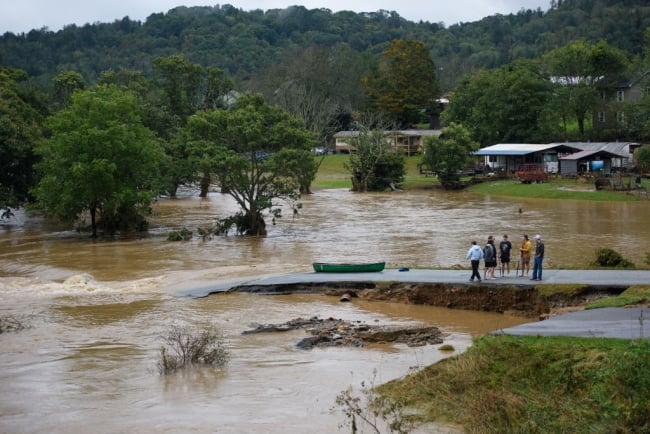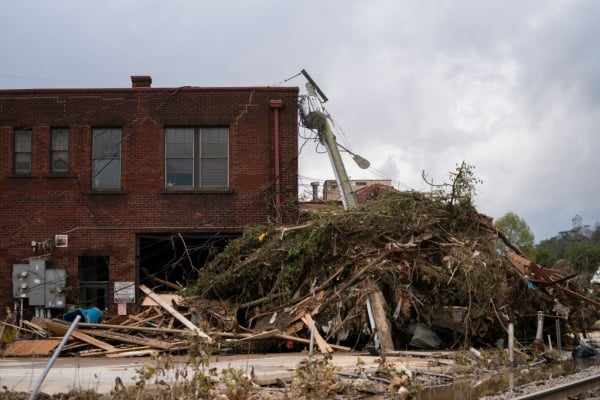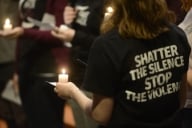You have /5 articles left.
Sign up for a free account or log in.

Hurricane Helene dropped more than a foot of rain across much of the Southeast, washing out roads in Boone, N.C.
Melissa Sue Gerrits/Getty Images
The University of North Carolina at Asheville canceled classes until Oct. 9 as the university and surrounding community recover from Hurricane Helene’s historic flooding, which wiped out roads, bridges and homes, largely cutting off western North Carolina.
“Conditions at UNC Asheville are difficult,” Chancellor Kimberly van Noort said in a message to the campus community Saturday afternoon. “Significant tree damage has occurred and parts of campus are inaccessible. Everyone is safe. Cell and internet coverage is nonexistent at this point.”
Van Noort assured families that students in the residence halls were safe and told nonmandatory employees and the public to avoid the campus.
Appalachian State University in Boone and Western Carolina University in Cullowhee canceled classes for this week as well.
“Road conditions vary and many roads in the area are treacherous or impassible,” a message from Appalachian State officials said. “Please limit travel and use extreme caution if you are traveling on foot or by vehicle.” None of the residence halls were “structurally compromised,” but the university is asking students to conserve water.
At Western Carolina University, officials made a landline available for students to call home to let family know they are safe. They encouraged students to stay on campus, because the roads aren’t safe for travel.

Storm damage in the Biltmore Village in the aftermath of Hurricane Helene on Sept. 28, 2024, in Asheville, N.C.
Sean Rayford/Getty Images
“The catastrophic devastation to western North Carolina is like nothing we have ever seen,” Governor Roy Cooper said in a statement Saturday.
So far, more than 90 people have died as a result of Hurricane Helene, which made landfall Thursday as a Category 4 storm. The storm spanned more than 400 miles and sustained winds of up to 140 miles per hour, causing widespread flooding and destruction in Florida and the Southeast. Helene quickly moved north across Georgia and the Carolinas as it became a tropical storm.
Officials in Buncombe County, which includes Asheville, acknowledged that the storm caught them off guard and warned of a long recovery.
“As we assess the damage, this is looking to be Buncombe County’s own Hurricane Katrina,” county manager Avril Pinder said Saturday at a media briefing.
In South Carolina, Clemson University opened some of its facilities to members of the public who needed to recharge devices or access the public Wi-Fi. Other universities in the western part of the state are without power and canceling classes, Greenville News reported.
Furman University in Greenville doesn’t expect to have power until Tuesday, so the campus is closed and classes are canceled through at least Wednesday.
“The lack of power and full access to the internet greatly impacts students’ living conditions, classrooms, dining and activities,” Furman officials wrote in a campus message. “Moreover, the vast majority of Furman’s faculty and staff do not have power at home, and many are dealing with storm damage.”
Meanwhile, students in Florida and Georgia are heading back to class Monday as their universities resume normal operations after canceling classes and, in some cases, evacuating their campuses.
At the Florida colleges in Helene’s path, little damage has been reported. The University of South Florida St. Petersburg reopened Sunday, though a few buildings remain closed. Students were bused temporarily to the university’s main campus in Tampa, but they returned Sunday. At the University of Florida, Helene’s strong winds brought down a century-old oak tree.
Some students in Florida who were asked to relocate were eager to get back to their regular routine, local media reported. Anticipating a direct hit, Florida State University in Tallahassee temporarily moved students living on campus to the conference center, which had been outfitted with cots and dining hall food; they also created a separate “refuge facility” for off-campus students at its indoor arena, according to a campus alert. Tallahassee and Florida State were “spared the worst,” Florida State president Richard McCullough said in a statement to the Tallahassee Democrat.
Anastasia Russel, an 18 year-old student at Florida State, told CNN that she was concerned her dorm would be destroyed. “Yeah, it’s rough,” she said. “I just miss my bed.” The university instructed students to bring only one suitcase to the conference center, Russel added.
For other students in Florida, evacuating and weathering a hurricane has become an annual event.
“Past years have honestly been very similar to this year, where there’s a lot of confusion and uncertainty about what’s going to happen,” Ayslin Edwards, a USF St. Petersburg senior, told The Crows Nest, a student newspaper. Edwards said she’s had to evacuate every year since she started her undergraduate degree in fall 2021.








